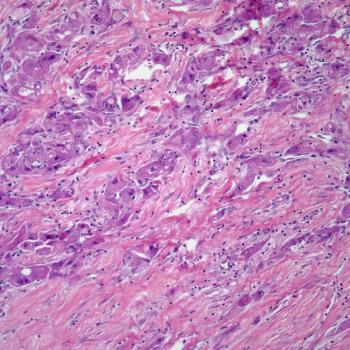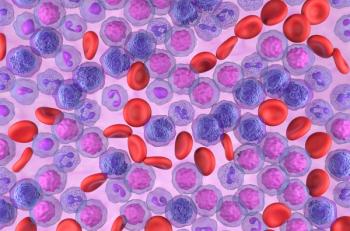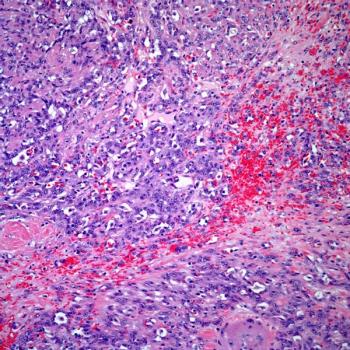
Developers plan to assess onvansertib plus standard of care as a frontline treatment for patients with metastatic pancreatic ductal adenocarcinoma in an investigator-initiated trial.

Your AI-Trained Oncology Knowledge Connection!


Russ Conroy is an Associate Editor for CancerNetwork. He grew up in Hillsborough, New Jersey, and graduated from Rutgers University-New Brunswick in 2022.
On the weekends, he likes to unwind by playing video games with friends, tailgating at Rutgers football games with his family, or building his music collection with a visit to Princeton Record Exchange.

Developers plan to assess onvansertib plus standard of care as a frontline treatment for patients with metastatic pancreatic ductal adenocarcinoma in an investigator-initiated trial.

A real-world study found most patients with lower-risk myelodysplastic syndrome do not appear to require dose escalations of luspatercept.

Approval of the CRCdx RAS Mutation Detection Kit may improve access to panitumumab for the treatment of patients with colorectal cancer.

Rates of treatment discontinuation appear to be higher in patients receiving nivolumab plus ipilimumab for cancer than those receiving nivolumab monotherapy.

The FDA companion diagnostic designation for the FoundationOne CDx and FoundationOne Liquid CDx may improve access to treatment with encorafenib plus binimetinib for those with BRAF V600E-mutated non–small cell lung cancer.

Findings from a meta-analysis highlight the effect of varying censorship criteria for the definition of surrogate end points in localized prostate cancer randomized clinical trials.

Findings from the phase 3 TARGET-TP trial support a biomarker-driven primary thromboprophylaxis strategy in adult patients with lung and gastrointestinal cancers as routine care.

Nivolumab is now available as an adjuvant treatment for patients with completely resected stage IIB or IIC melanoma following its approval by the FDA based on data from the phase 3 CheckMate-76k trial.

Adding TPST-1120 to atezolizumab and bevacizumab appears to improve progression-free survival compared with atezolizumab and bevacizumab alone in patients with hepatocellular carcinoma.

Data from the phase 2 SAMCO-PRODIGE 54 trial may support the use of immune checkpoint inhibitors over standard second-line therapy in mismatch repair–deficient and/or microsatellite instability–high metastatic colorectal cancer.

Data from a phase 1 study support the orphan drug designation for SLS009 as a treatment for patients with acute myeloid leukemia.

The FDA companion diagnostic designation for FoundationOne CDx may improve access to treatment with selpercatinib in select patients with solid tumors harboring a RET gene fusion.

CAR-HEMATOTOX scores may enable risk stratification of patients with mantle cell lymphoma prior to treatment with brexucabtagene autoleucel.

Elevated white blood cell counts also appear to correlate with shorter overall survival in patients receiving standard induction chemotherapy plus cytarabine for acute myeloid leukemia.

Investigators plan to share data from the phase 3 KEYNOTE-671 trial assessing perioperative pembrolizumab in resectable non–small cell lung cancer with international regulatory health authorities.

A biologic license application supplement resubmission for the pegfilgrastim-cbqv on-body injector follows the resolution of inspection findings highlighted in a complete response letter from the FDA.

Investigators anticipate sharing final data from the phase 2 TELLOMAK trial assessing lacutamab among patients with cutaneous T-cell lymphoma in the fourth quarter of 2023.

Investigators report that MRI by itself seems to be an inadequate tool for determining pathologic complete response in rectal adenocarcinoma during total neoadjuvant therapy.

Investigators will continue to assess overall survival in patients treated with pembrolizumab for localized muscle-invasive urothelial carcinoma as part of the phase 3 AMBASSADOR trial.

Findings suggest that sensitive circulating tumor DNA analysis may be a valuable tool for guiding neoadjuvant treatment decision-making in early-stage triple-negative breast cancer.

Patients receiving ibrutinib plus venetoclax for chronic lymphocytic leukemia appear to experience improved overall survival at 46 months compared with those receiving chlorambucil plus obinutuzumab in the phase 3 GLOW study.

Complete responses in patients with pretreated relapsed/refractory mantle cell lymphoma treated with glofitamab appear to be early and enduring.

Combining pembrolizumab with enfortumab vedotin-ejfv significantly improves responses vs chemotherapy among patients with previously untreated locally advanced or metastatic urothelial carcinoma.

Data from the phase 2 SGNTUC-019 study support HER2 as an actionable biomarker in patients with metastatic biliary tract cancer.

Findings from a meta-analysis support the feasibility of administering hysteroscopic surgery plus progesterone to patients of childbearing age with various types of endometrial cancer.

Investigators will present overall survival and objective response data from the phase 3 MARIPOSA-2 trial assessing amivantamab in EGFR exon 19 deletion–positive non–small cell lung cancer at a future scientific meeting.

Investigators are assessing AVB-001 as a treatment for those with high-grade serous adenocarcinoma of the ovary, primary peritoneum, or fallopian tube in a phase 1/2 trial.

Data from a phase 1 trial highlight a clinically acceptable safety profile for BI 764532 in patients with extensive-stage small cell lung cancer and extrapulmonary neuroendocrine carcinomas.

Patients with paroxysmal nocturnal hemoglobinuria can now self-administer pegcetacoplan subcutaneously following the FDA’s approval of an injector.

Data from the FABREC trial support the use of hypofractionated postmastectomy radiotherapy in patients with breast cancer following implant-based reconstruction.